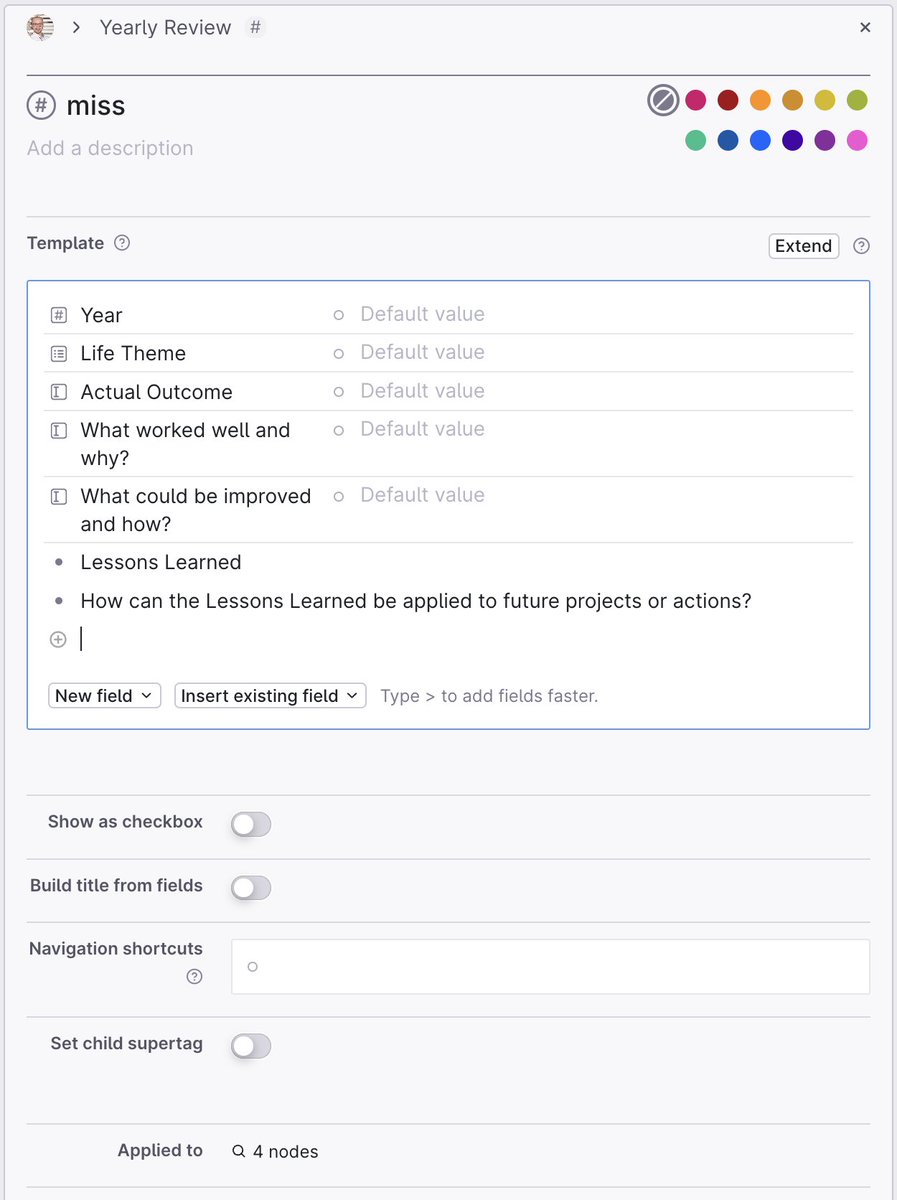Annual Reviews are incredibly powerful tools
And NOW is the time to build the systems to enable the perfect review at the end of 2023
Here's how to set it up in @tana_inc:
And NOW is the time to build the systems to enable the perfect review at the end of 2023
Here's how to set it up in @tana_inc:
First, you'll want to record your wins!
Create a supertag #win – and on your daily node, simply write down any wins you have and tag them with it.
This supertag has two fields set up, "Life Theme" and "Year":
Create a supertag #win – and on your daily node, simply write down any wins you have and tag them with it.
This supertag has two fields set up, "Life Theme" and "Year":

The "Life Theme" lets you record where your win happened:
I have set up these themes:
🌞 Health (Physical, Mental, Spiritual)
💸 Wealth (Investing, Spending, Earning)
❤️ Relationships (Friends, Family, Romantic)
🥳 Experiences (Travel, Leisure, Hobbies)
🏗️ Business
I have set up these themes:
🌞 Health (Physical, Mental, Spiritual)
💸 Wealth (Investing, Spending, Earning)
❤️ Relationships (Friends, Family, Romantic)
🥳 Experiences (Travel, Leisure, Hobbies)
🏗️ Business

(By the way, I have the idea for collecting wins [and misses, coming right up] and these life-themes from @Nicolascole77 and @dickiebush's Annual Review guide – check it out here:
theyearlyreview.com )
theyearlyreview.com )
The second field is the "Year" field.
Make it an instance-field for the supertag #year, and auto-initialize it "to ancestor with this supertag".
This means the field is auto-filled with the current year, as long as you tag something on your daily node. Super neat!
Make it an instance-field for the supertag #year, and auto-initialize it "to ancestor with this supertag".
This means the field is auto-filled with the current year, as long as you tag something on your daily node. Super neat!

You also want to record your misses, of course – so create a supertag #miss as well!
Same fields, "Life Theme" and "Year", and you're set!
I've added a couple of more fields to this supertag, though:
I use it to prompt a mini lessons learned report.
Same fields, "Life Theme" and "Year", and you're set!
I've added a couple of more fields to this supertag, though:
I use it to prompt a mini lessons learned report.

So I prompt myself with these additional fields for my misses:
"Actual Outcome" – what actually happened
"What worked well, why?"
"What could be improved and how"
Plus open sections where I can think about lessons learned and how I can apply them in the future
"Actual Outcome" – what actually happened
"What worked well, why?"
"What could be improved and how"
Plus open sections where I can think about lessons learned and how I can apply them in the future
And that's all you need for during the year!
You can, of course, also set up the yearly review supertag already:
By adding live searches for your #wins and #misses everything you write down on your daily nodes will collect automatically.
You can, of course, also set up the yearly review supertag already:
By adding live searches for your #wins and #misses everything you write down on your daily nodes will collect automatically.

And a BONUS hack:
By using the "Less Than" and "Greater Than" operators in live searches, you can do trivial monthly reviews too!
Because you write down your wins and misses on the daily node, you can use the "Calendar date" system field to find all the wins of a month!
By using the "Less Than" and "Greater Than" operators in live searches, you can do trivial monthly reviews too!
Because you write down your wins and misses on the daily node, you can use the "Calendar date" system field to find all the wins of a month!

I really hope you've found this thread helpful!
Follow me @cortexfutura for more, and like/retweet the first tweet below to share it with others:
Follow me @cortexfutura for more, and like/retweet the first tweet below to share it with others:
https://twitter.com/cortexfutura/status/1609987938913497092
Also, if you want to build your own supertag systems just like this one in Tana, I teach a course where you'll learn _in detail_ how to set these up and iterate on them over time (Tana invite included!)
Check it out here:
go.cortexfutura.com/course/masteri…
Check it out here:
go.cortexfutura.com/course/masteri…
• • •
Missing some Tweet in this thread? You can try to
force a refresh














